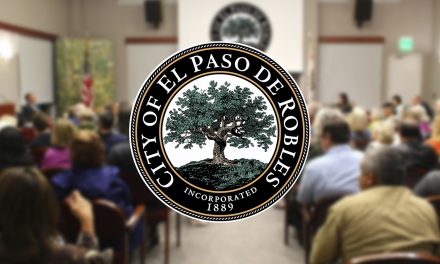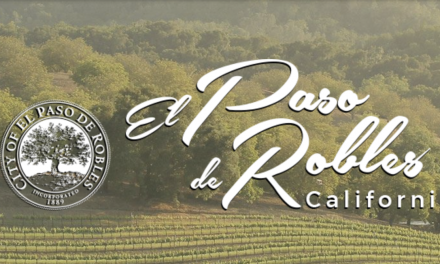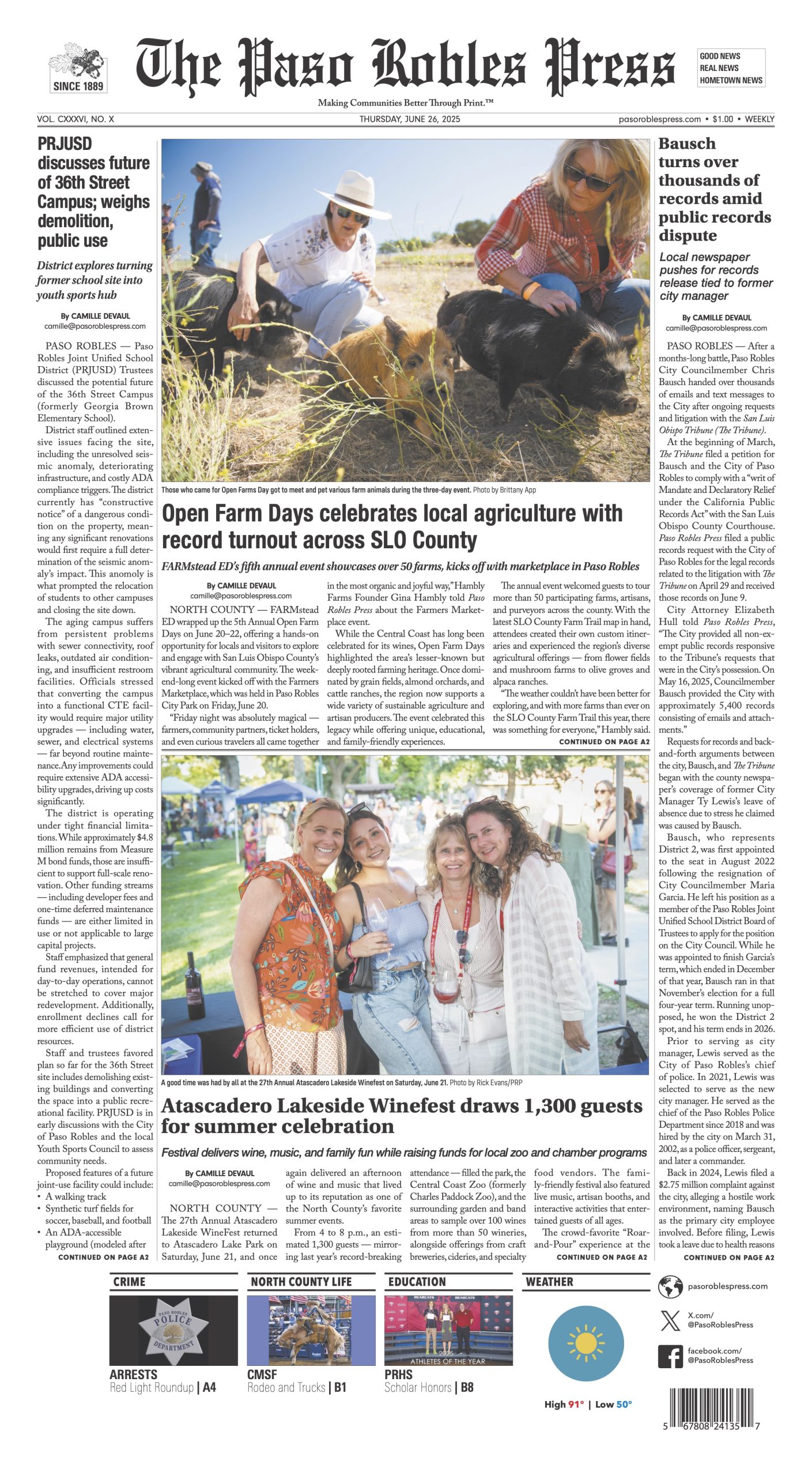A computer-assisted designer by trade and a Paso Robles resident for the past 30 years, Jim Reed has served on the City Council since 2014. Reed has a background in construction, HVAC installation and is a licensed contractor. He said that he originally got involved in City government after being frustrated at the process of dealing with the city’s building and planning departments and now he wants to continue to serve in order to make sure that the voice of the citizens is heard.
“There’s this opinion out there from the constituents that think their government doesn’t really represent them,” Reed said. “I tend to agree that government does work on autopilot and a lot of times the decisions we make don’t really factor the thoughts and feelings of the constituents in and that’s what I’d like to fix. I’d like to have people feel like their government represents them again.”
Reed said that in his time on the Council the building permit process has been greatly improved.
“It was just totally out of control, just nuts,” he said of the department previous to his term. “I don’t have any other way of putting it — just rules and regulations and everything they could do to keep from issuing permits. So that’s why I got involved was just to get this department working again.”
Now Reed said that he has contractors call him up to personally thank him for the progress.
“The permit process is a lot more fluid and the City employees will work with you a little more and there’s not just a bunch of little dictators in there. It’s a whole lot better now. It’s got a long way to go but at least we’ve come this far.”
Concerning his vision for the future of Paso Robles, Reed said that the City is clearly at a turning point.
“Our City’s going in a big city direction with a lot of growth and it gets back to the citizens who live here now who want to try to preserve this hometown, smalltown, Pioneer Day Parade type mentality here and I agree with them,” he said. “We can’t really stop the growth in some respects but we sure as heck should be able to control it and point it in a certain direction that maintains what we already have here and what we like around here.”
On Thursday, Oct. 4 the two mayoral candidates, along with the four Council candidates gathered for a question-and-answer forum at the Paso Robles Elks Lodge, introducing themselves before fielding questions from the moderator, Paso Robles Joint Unified School District Chris Williams, along with questions from the public.
During his introduction, Reed said that although he’s been a Council member for four years, “There’s still a long way to go.”
“I just feel that I still have a lot left to offer the city,” he said. “I have a lot of fight left in me, a lot of kick left in me and I still have some good ideas that I’d like to see come to fruition. I believe that from the mayor’s standpoint, from the pedestal, I would have more success and more luck and a little better feel on how things work and I would be able to accomplish more for the city.”
WHAT WILL YOU DO TO FACILITATE HOUSING FOR WORKERS AND FAMILIES IN PASO ROBLES?
Reed also pointed to the City’s recent efforts to reduce impact fees for developers to help stimulate new building.
“We want new businesses to come in but without places for them that’s a little hard,” he said.
Reed said that he’d like to see the City focus more on addressing the problem of short-term vacation rentals pushing families and workers out of the housing market.
“We’re taking these inexpensive homes, the kinda first-time homebuyer might buy, and the prices are being jacked up so high that nobody can afford to buy them,” he said. “It’s already too far out of control. We need to get our neighborhoods back to where people can afford to live here.”
IN YOUR OPINION, WHAT IS THE BIGGEST PROBLEM FACING PASO ROBLES AND WHAT IS YOUR SOLUTION?
With the recent boom of development and tourism in Paso Robles, Reed said that managing growth will be the biggest problem facing Paso Robles in the near future.
“We’ve got a lot of growth coming,” he said. “People are concerned about it. The roads are congested already. We need to really be looking at how we’re going to manage this future growth to where we keep our city the city we all love to live here… How do we keep this place, this Paso Robles that we all live here, we all love? That’s going to be a real challenge. I wish I could say I had a real definitive answer but it’s going to be chipping at it piece-by-piece and starting now, starting early and when the real problem gets here we’ll be more suited to handle it.”
WHAT IS YOUR POSITION ON SB 54, THE SANCTUARY CITY AND WILL YOU PROACTIVELY WORK WITH OR AGAINST ICE TO REMOVE CONVICTED CRIMINAL ILLEGAL ALIENS OUT OF PASO ROBLES?
Reed spoke out strongly against SB-54, calling it a “Constitutional issue.”
Presumably referring to the local Hispanic population who spoke out in favor of SB-54 at City Council meetings earlier this year, or perhaps California’s Hispanic population in general, Reed said, “The problem with this whole SB-54 situation is that everybody keeps dragging the good people — and it’s only about criminals who are in this country illegally… The people that are here, they keep throwing themselves into the mix and I think it would go over a lot better if we could talk about the irrational immigration policies. The immigration policies are what’s causing this whole problem. If we fix the immigration policies, let our law enforcement agents work and take the criminals out and if we don’t send them to another country, at least prosecute them, throw them in jail. The whole SB-54 thing to me is a bad situation and it needs to get fixed.
RESIDENTS KEEP BEING TOLD THERE’S A SHORTAGE OF WATER BUT WE KEEP BUILDING HOTELS. HOW ARE THE TWO COMPATIBLE? DO YOU WANT PASO TO GROW? AND WOULD YOU PROMOTE TOURISM THROUGH THE BUDGET?
Reed placed the blame for the misconception that the city has a water shortage on a state mandate that required Paso Robles to cut its water usage by 25 percent when the city had already voluntarily reduced usage by 25 percent in the face of the ongoing drought at the time.
“That kind of hurt and everybody knows it kind of hurt,” he said. “Our government workers had to go out and put tags on people’s houses for using too much water. It was a bad time and everybody got a little upset about it and rightfully so.”
After the Nacimiento Pipeline Project and the city’s new water treatment plant came online, the water problems disappeared, Reed said.
“All of a sudden we had more water than we knew what to do with but everybody still has it in their mind that we don’t have any water,” he said. “We do.”
Reed did not address the issues of growth or tourism during his response.












